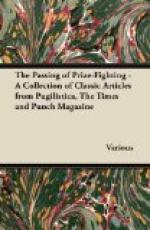Each one he touched rang softly like a
bell;
He pointed out to me
Great harvest moons with russet light
in them,
Pale moons to gleam where snows grow white
in them,
Red moons for victory,
And steadfast moons for men in ships at
sea.
The man who came with many moons to sell
Opened his basket wide;
Showed me the filmy crescent moons in
it,
And the piled discs (like silver spoons)
in it
That push and pull the tide,
And small sweet honey-moons to give a
bride.
“This moon,” he said, “you
will remember well;
Its price is wealth untold;”
Took a camp-moon he vowed he stole for
me
And softly wrapped to keep it whole for
me.
I heaped his feet with gold;
He changed, and said the moon might not
be sold.
Then I was angry that with moons to sell
He thought he had the right
To keep that one. Those who were
lent to us
Had written the brief notes they sent
to us
When it shone out at night.
I caught it to my heart and held it tight.
* * * * *
“Twenty Students Require
clean, respectable Board-Residence; would
not object to Share Bed.”—Provincial
Paper.
They should have lived in the days of Og, the King of Basan; his bedstead was a bedstead.
* * * * *
“Calcutta.
During the past few weeks several parties of Afghan merchants and traders have settled up their affairs and come into India. In order to avoid being questioned by British poets in the Khyber, they have entered this country by way of the Sissobi pass.”—Indian Paper.
Some of our poets are notoriously curious, and we are hardly surprised to learn that the Afghans could not “abide their question.”
* * * * *
[Illustration: A COCK-AND-BULL STORY.]
* * * * *
THE LANGUAGE DIFFICULTY.
“The jolly part about an island where there are no towns and no railways,” said Willoughby, “is that you have thrills of excitement as to where you will sleep next night or eat your next meal. Now when we land at Lochrie Bay to-morrow it will be nearly lunch-time; but shall we get lunch?”
“I can answer that,” replied MacFadden, whose grandfather was a Scotsman, and who was once in Edinburgh for a week; “the map shows it is only five miles to Waterfoot, and there’s sure to be an hotel there. Those little Scots inns are all right.”
“Yes,” chimed in Sylvia, “and very likely there’ll be nothing to eat when we get there. I am thinking of you three men, of course,” she added hastily; “we girls don’t want much.”
“As for me,” said Willoughby, looking at Sylvia, whom he has adored dumbly for years, “very little satisfies me. I’m like the fellow who said, ‘a crust of bread, a bottle of wine and you.’ You know the chap, MacFadden.”




